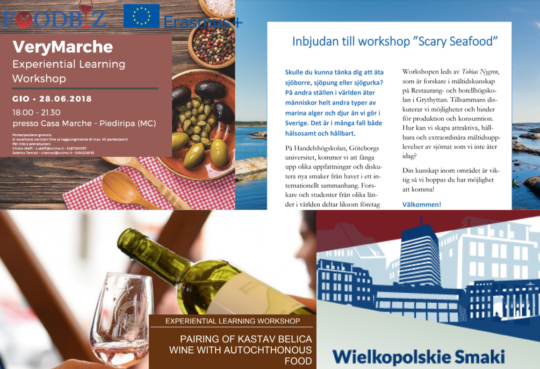University partners in the FOODBIZ project completed the first round of planned multiplier events by organising experiential learning workshops aimed to involve students, business players and researchers operating in their local food sectors.
The workshops were organised by the University of Macerata (Italy) – leading partner of FOODBIZ; the University of Gothenburg (Sweden); the Faculty of Tourism and Hospitality Management of the University of Rijeka (Croatia); and the University of Economics and Business of Poznan (Poland). They entailed the presentation and tasting of local products paired with participants’ activities designed to encourage critical thinking.
Identifying what local products best represent Wielkopolska region was the aim of Taste of Wielkopolska workshop, organised by the University of Economics and Business of Poznan on 26 June 2018. Participants’ discussion pinpointed the main issues faced by the local food sector, including promotion strategies, poor support of small enterprises, and cooperation among producers.
VeryMarche was the title of the workshop set up by the University of Macerata on 28 June 2018 which focused on producers’ and consumers’ perceptions of local food products considered to be representative of the region, as well as possible strategies to promote them and the region as a whole through collaboration among producers.
The University of Gothenburg built their workshop around the theme Scary Seafood, encouraging discussion on how to increase attractiveness of certain types of seafood that, for the way they look, are not usually eaten by local people and visitors in Sweden. However, they represent locally-produced, sustainable alternatives to the current overexploitation of the oceans. The workshop took place on 4 September 2018.
Finally, on 12 October 2018, the Faculty of Tourism and Hospitality Management of the University of Rijeka focused on the Pairing of Kastav Belica Wine With Autochthonous Food, encouraging discussion on possible pairings between local wines and local food products of Kvarner region.
As mentioned in FOODBIZ project proposal, the workshops “provide useful information to producers who will understand how people see their products or the products of their territory, and to students, which will be able to understand in context how from one side consumers see the products and from the other how the producers look at them.” Furthermore, “the interactive process that characterises these workshops, favours the development of an attitude towards critical thinking, seen as a core competence for the development of an entrepreneurial attitude among students, and for achieving an effectiveness in the process of entrepreneurial education.”
FOODBIZ – University and business learning for new employability paths in food and gastronomy is a project funded in the framework of the action on Strategic Partnerships for Higher Education of the Erasmus+ programme and aims to enhance employability of higher education students in food and gastronomy, by providing them useful skills to enter the local food market.
IGCAT is partner in the FOODBIZ project together with the four mentioned universities and: the Piceno Lab of the Mediterranean Diet (Italy); the Svinesund Committee (Sweden); and the European Cultural Tourism Network (ECTN).
About IGCAT
IGCAT is a non-profit institute established in 2012, working with regional stakeholder consortiums in the fields of gastronomy, culture, arts and tourism. It counts on the expertise of a worldwide network of experts and works in partnership with specialised intergovernmental organisations.
IGCAT aims to empower local communities by guiding, facilitating, and supporting leaders in regions to understand the potential of their distinct food, culture, arts and sustainable tourism assets.
IGCAT provides the Region of Gastronomy Award and is the official secretariat for the European Region of Gastronomy Platform. Furthermore, the Institute has developed the European Young Chef Award the Local Food Gift Challenge, the Top Food Experiences of the Year and the Food Film Festivals project.
28 December 2018
